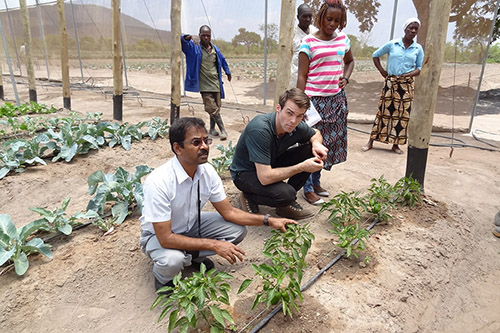Main Content



About the Program
The major in Environmental and Business Economics is a program of study for students interested in careers in business and management. Students learn to think strategically about the business environment within which firms, government agencies and non-governmental organizations operate and devise appropriate responses to gain a strategic advantage within such an environment.
The Learning Goal of the Environmental and Business Economics Program:
- A foundational knowledge of the principles of economics.
- Knowledge of practical economic and analytical problem-solving techniques, including the use of computer tools and applications.
- An ability to apply economic concepts to analyze public and private policy issues.
- Practice of the institutional factors that underlie and influence policy decisions.
- Apply and assess the consequences of fundamental management concepts in the workplace environment.
- Apply sound financial and accounting principles to evaluate firm performance.
- Develop students’ quantitative, analytical, and problem-solving skills for the application of economic principles to agricultural, food, and resource policy issues.
On completion of the learning goals, graduates from this program will have attained the ability to:
- Utilize and explain core economic, management, financial and accounting concepts
- Apply economic theories and concepts to contemporary social issues, as well as the formulation of policy
- Demonstrate quantitative reasoning skills
- Recognize the role of ethical values in economic decisions
- Demonstrate critical and effective communication skills
One of Our EBE Grads Speaks About His Environmental Career Choice
Options in Program
Majors in the Environmental and Business Economics program select one of three options.
The Business Economics option includes all of the same foundation courses required in traditional business school curricula plus the additional analytical tools provided in the program’s economic courses. It is this rich blend of courses such as Finance, Management, Marketing, Demand and Price Analysis, and Economics of Production that make graduates from this option so attractive to employers in business and industry as well as to those in government agencies and non-profit organizations. Indeed, many of the graduates from this option are among the ranking economists, analysts, financial advisers, managers, marketing specialists, consultants, and policy director in agencies and companies ranging from biotechnology and pharmaceutical industries to Wall Street to smaller organizations including small business and entrepreneurial ventures. The option familiarizes students both with analytical and decision-making techniques used in the business world, and with the public and private institutional framework within which businesses operate. It is also appropriate for students who are interested in graduate studies in business management or economics.
2. Environmental & Resource Economics
The Environmental and Resource Economics applies economics and analytical and decision-making techniques in assessing problems of the environment and natural resources. This option also considers the institutional framework within which public policy is developed. It is appropriate for those desiring employment with firms who must comply with environmental regulations or with governmental agencies concerned with environmental practices and policies and prepares students for graduate study in related areas.
The Food Industry Economics option emphasizes the application of economics in the areas of food policy, marketing and finance. This option is especially appropriate for students seeking employment in the food industry or in federal or state departments of agriculture and for students interested in graduate study in agricultural economics.
The successful completion of the program requires grades of “C” or better in all required courses in the major and no more than one “D” in the option area courses in the major. To be eligible for graduation requires a minimum grade point average of 2.0, where 4.0 is highest over all, in courses including the general education courses, unspecified elective courses, and courses in the major.
* There is a legacy option called Food Science and Management that is no longer offered in the EBE major. Please do not select this option when you declare the EBE major.